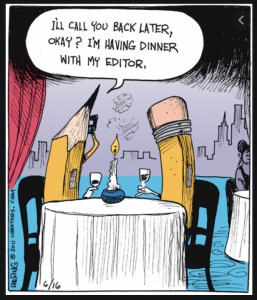Here’s a couple of openers from well-known thriller writers;
“Sam Harrison swung his agile body out of the silver blue Ford Aerostar, which he had parked ono Q Street in the Georgetown section of Washington.” [Jack and Jill by James Patterson]
“Duke Russell is not guilty of the unspeakable crimes for which he was convicted; nonetheless, he is scheduled to be executed for them in one hour and forty-four minutes.” [The Guardians by John Grisham]
Only two examples, but both start with the name of the main character/protagonist and both give a sense of place – Washington for Patterson and a prison(?) for Grisham. I prefer the urgency and mystery given in John Grisham’s opener, for two reasons; first, there are ‘unspeakable crimes’ which ups my interest; second, time is running out. A third reason could be that we owned a Ford wagon a while back and we were not that thrilled with it (LOL).
In my new novel I hope the opening line grabs the reader’s interest by suggesting tension, introducing a female character and creating a need to find out who is being followed and why. It reads;
“You are being followed,” she whispers.
I love this comment by Dawn Schaefer on the opening lines of Tinker, Tailor, Soldier, Spy by John le Carré; “There is the sense of having been dropped into the middle of a conversation, and a gossipy one at that...” And what, you will no doubt ask, are these lines?
“The truth is, if old Major Dover hadn’t dropped dead at Taunton races Jim would never have come to Thursgood’s at all.”
Now that we are on about Carré, here is my favorite opener (from Call for the Dead);
“When Lady Ann Sercomb married George Smiley towards the end of the war she described him to her astonished Mayfair friends as breathtakingly ordinary.”

 Scott Bell says, “Write a certain number of words, on a regular basis—a quota. Then, you look up at some point—three or four months, or a year—and you have a completed novel. I used to do a daily quota, but felt like I was a slave to it. So, I do a weekly quota now. If I miss a day, I can make up my weekly quota. And, I take one day off a week. That way, you become a prolific writer.”
Scott Bell says, “Write a certain number of words, on a regular basis—a quota. Then, you look up at some point—three or four months, or a year—and you have a completed novel. I used to do a daily quota, but felt like I was a slave to it. So, I do a weekly quota now. If I miss a day, I can make up my weekly quota. And, I take one day off a week. That way, you become a prolific writer.” From my own experience, I have enjoyed using online grammatical aids, to a point! Here’s my humble take on them:
From my own experience, I have enjoyed using online grammatical aids, to a point! Here’s my humble take on them: